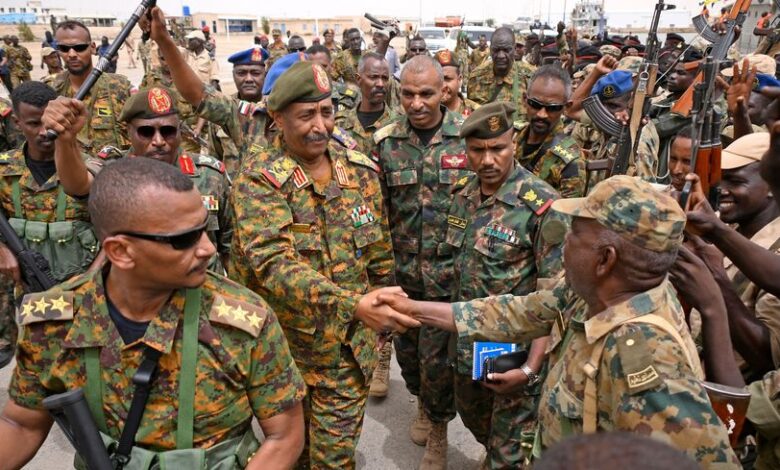Political Blackmail and Islamist Dominance over the Sudanese Army: No to War, Yes to Revolution

Since the outbreak of armed conflict in Sudan in April 2023 between the Sudanese army led by General Abdel Fattah al-Burhan and the Rapid Support Forces (RSF) led by Mohamed Hamdan Dagalo (Hemedti), the country has been experiencing one of the darkest periods in its history. A brutal war has ravaged cities, displaced millions, and shattered what remained of the state’s institutions.
-
Sudanese Army Issues New Decision Banning Recruitment Operations for Allied Armed Movements
-
Escalation of Tensions Between Sudanese Army Leaders and Islamist Militias: What Are the Causes?
Yet behind this military conflict lies a deeper, less visible struggle: the battle for influence and political blackmail carried out by the Islamist movement (the Kizan) within the Sudanese army.
Blackmail as a Tool of Control
In Port Sudan, now the de facto seat of the transitional authority led by al-Burhan, remnants of the former regime have embedded themselves in the decision-making process, holding certain military leaders hostage. It has become common practice to threaten officers with “exposure” unless they continue the war: either you fight, or we expose your corruption to the public.
-
Crisis of Trust between the Sudanese Army and Its Militias… What Lies Behind the Recruitment Freeze Decision?
-
Khartoum: Liberation or Genocide? Sudanese Army Accused of War Crimes
Several high-ranking officers, not ideologically aligned with the Islamist movement but previously involved in corruption or abuse of power, have fallen victim to this form of coercion. Faced with the threat of prosecution or public disgrace, many have chosen to pursue the war.
Corruption as an Institution
Corruption is not a passing anomaly — it has become a structural institution inherited from the National Congress Party, the political arm of the Islamist movement. According to reports from Transparency International and Human Rights Watch, state institutions — especially the military — have experienced systemic corruption over the past two decades: shady military deals, looting of gold resources, and monopolization of commercial ventures under the guise of national security.
-
The Muslim Brotherhood’s Congratulations to the Sudanese Army… A Move That Reveals the Group’s Role in Fueling the Conflict
-
The Muslim Brotherhood’s Congratulations to the Sudanese Army for the Liberation of Khartoum: A Reading of Political and Military Dimensions
As a result, many leaders have become complicit in order to maintain their positions, leaving the military in the grip of a movement that rejects modern statehood and civil liberties.
An Army Diverted from Its Mission
The Sudanese army, as envisioned after independence, was meant to be a national institution protecting the country from external threats. Today, it has become a tool in internal political struggles. What is happening in Port Sudan now is a continuation of a legacy of exclusion, domination, and corruption — political rivals are eliminated, revolutionary forces demonized, and anyone calling for peace is branded a traitor.
-
Sudanese Army’s Threats to its Neighbors: An Internal Distraction Signaling Regional Dangers
-
Sudanese Army’s Military Gains Undermine Chances of a Peaceful Resolution to the Crisis
Towards Rebuilding the State
Sudan does not merely need a ceasefire — it needs a complete re-foundation of the state and its institutions:
A national army free from partisan loyalties.
Professional security services not beholden to ideological agendas.
Independent media, beyond the control of the deep state.
A modern education system that does not foster hate or extremism.
We are facing a monumental historical task that can only be achieved through a unified national will that rejects war and destruction and raises the banner of the glorious December Revolution — a revolution born to restore dignity to the Sudanese people.
No to War, Yes to Revolution
We must raise our voices loud and clear: no to war, no to the Port Sudan government, no to death, no to oppression, no to corrupt power.
And say: yes to revolution, yes to a just state, yes to the dignity of the Sudanese people.
-
The Sudanese Army and the Use of Chemical Weapons: Recent War Violations and Humanitarian Impact
-
How the Muslim Brotherhood Reshaped the Sudanese Army












